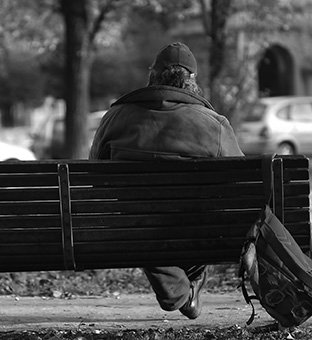
Homeless on a park bench
n our last
editorial, we focused on how healthcare was the most important issue for the
electorate based on an Ipsos/MRBI exit poll. After healthcare, the most
important issue was housing. Like healthcare, housing is a wide area. It
encompasses everything from someone trying to buy their first home, to the
growing problem of homelessness.
During
the election campaign, the news that a homeless man sustained serious injuries
when a Dublin City Council vehicle removed his tent on the Grand Canal while he
was still inside symbolised for many the Government’s perceived disregard for
the homeless population. According to Focus Ireland, homelessness has increased
by 280 per cent since December 2014. The figures do not include the large
amount of people who are sleeping rough.
Being
homeless also carries significant dangers for a person’s health, which a feature
in this issue explores. People without a home often experience complex and
chronic health conditions, including mental health and addiction issues, and
face barriers in accessing appropriate healthcare. They also have more visits
to emergency departments, longer inpatient stays and use an estimated 20 times
more hospital bed days.
In
an under-resourced healthcare system, there is a danger that this vulnerable
group is at risk of further marginalisation.
In
spite of the need for more support for the area, there have been admirable
initiatives to provide healthcare to Ireland’s homeless community. Safetynet
Primary Care was set up in 2007 as a network for health professionals and
organisations working to improve healthcare access for homeless people. Under
the stewardship of Dr Austin O’Carroll, this service has been essential in
meeting the community’s healthcare needs, which grew more pressing when the
country was in the midst of a recession.
More
recently, there has been the Inclusion Health group, based in St James’s
Hospital, and the Mater Misericordiae University Hospital. The group, which is
led by Dr Cliona Ní Cheallaigh, a Consultant in General Medicine and Infectious
Diseases at St James’s, is among the first of its kind in the world. It recognises
the complex medical and psychosocial needs and health inequalities experienced
by marginal populations, including homeless people. The group’s
multidisciplinary team has achieved promising results, with reductions in the
rates of admission, readmission, and lengths of stay.
At present, it is still run on a pilot
basis, but there are hopes the service can be eventually extended to other
hospitals throughout the country. This, of course, will require funding and
support. However, it is even more essential to address the root cause of the
problem. This is an era which increasingly recognises the importance of
prevention. The best way ultimately to improve the health of the homeless
community is to ensure that the shortage of social housing is addressed and an
adequate policy is developed to reduce the numbers of people without a home.





Leave a Reply
You must be logged in to post a comment.